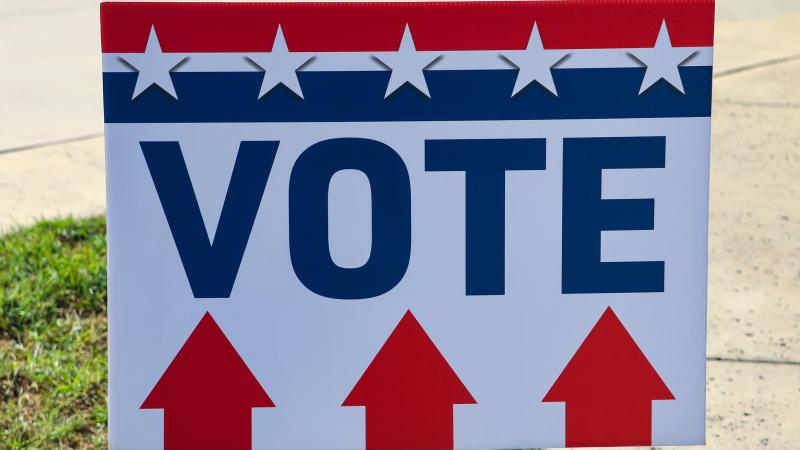Republicans seize on voter frustration in quest for control of Congress but verdict delayed
Gallup poll found 81% of Americans unhappy with where nation is heading.
A newly energized Republican Party fought Tuesday night to channel voter frustration with inflation, crime and the direction of the country in their bid to win back control of Congress and blunt the agenda of Joe Biden and ruling Democrats in governor's mansions and statehouses nationwide.
But like the last presidential contest, a verdict was deferred in many close races beyond election day, leaving America with another cliffhanger in a closely divided nation. Even another runoff in a Georgia Senate race was still in the cards early Wednesday.
All eyes were on a new generation of Republicans, from the former television news anchor Kari Lake in Arizona's gubernatorial race to former Navy helicopter pilot Jen Kiggans, who wrestled a Democrat House seat in Virginia from incumbent and fellow military veteran Rep. Elaine Luria.
A new generation of Hispanic voters and candidates aligned with Donald Trump were also flexing their muscle. In an early bellwether, Republican Anna Paulina Luna won a Democrat House seat in central Florida, while the heavily Latino electorate of Miami-Dade sent Gov. Ron DeSantis and Sen. Marco Rubio to landslide reelection wins, providing further evidence Florida is transitioning from a tossup battleground to a solidly red state.
But Republican hopes for a "red tsunami" faded as Democrat incumbents like Sens. Maggie Hassan of New Hampshire and Michael Bennett of Colorado and Patty Murray of Washington state held their seats as did several major Democrat governors. Governors races in New York, Wisconsin and Arizona were too close to call post-midnight.
With Trump-backed J.D. Vance winning in Ohio and Ted Budd in North Carolina, control of the Senate came down to razor-thin races in Wisconsin, Pennsylvania, Georgia and Nevada, four states that also determined the outcome of the 2020 presidential race. Republicans were more buoyed about their chances of a takeover of the U.S. House as Republicans were leading in some bellwether races from New York to Michigan.
Democrats also won some precedent-setting victories, as Wes Moore became the first black governor in Maryland, while Maura Healey in Massachusetts became the nation's first open lesbian to be elected governor. Some generational change was also underway, as Democrat Rep. Peter Welch won the race to succeed Sen. Patrick Leahy, who is retiring after 48 years in the Senate.
Both early and day-of voting was heavy compared to 2018, as several states like Georgia tested new voter integrity measures enacted after the 2020 election. Most voting went forward with few hitches, with a big exception in Arizona's Maricopa County, the state's largest, where as many as 20% of machines had trouble early in the day tabulating ballots before a printer error was fixed.
But early signs were that voter dissatisfaction with inflation and the overall direction of the country two years into Biden's command were going to be bigger drivers in the midterms than election integrity issues.
CNN's exit poll showed more than seven in 10 voters nationwide believed the country was on the wrong track in the hands of Biden Democrats and that inflation was their number one concern. Gallup showed the dissatisfaction level even higher at 81%
President Biden, who would face divided government and a host of GOP-led congressional probes if Republicans captured Congress, had much at stake in Tuesday night's results. But he made no Election Day appearances, as he prepared to depart the United States for an international climate conference.
Former President Donald Trump tirelessly crisscrossed the country for his preferred candidates — Dr. Mehmet Oz, Kari Lake, J.D. Vance and Blake Masters, among them — but also signaled he viewed he midterms as a proxy war with Biden ahead of the 2024 election.
Trump also sent a warning shot Tuesday to his distant but closest party rival, DeSantis. "I would tell you things about him that won't be very flattering — I know more about him than anybody — other than, perhaps, his wife," Trump said.
The marquee battle was for control of the two chambers of Congress, where Republicans have been surging throughout the fall by promising to block the Biden agenda and take action to lower inflation, food prices and gas prices while combatting crime and efforts to supplant parents' role in their children's education.
Biden and his Democratic allies tried to cast the election as a battle over the future of Democracy and abortion access after the Supreme Court overturned Roe v. Wade this summer. But polling suggested that for voters those issues were taking a back seat to the economy and personal security.
An ABC News/Washington Post poll released Sunday found that economic issues — including inflation, recessionary fears and an unstable stock market — are by far the most concerning for voters.
The poll found that 80% of voters named the economy as a top issue, with 77% specifically pointing to inflation, which is at its highest level in four decades. The poll found voters trust Republicans more on the economy as well as crime, another leading issue right now.
The poll found Democrats are more trusted on abortion, an issue that surged in importance following the Supreme Court's decision but which did not appear to be at the forefront of most voters' concerns.
Noted pollster Robert Cahaly told Just the News that voters appeared to be in a firing mood. "These voters are concerned with the economy," Cahaly said. "They're worried about their kids and grandkids overdosing on fentanyl. They are concerned about the price of gas, the state of the supply chain. They're concerned about their daily lives and how difficult things have gotten. ... And many suburban and urban voters are very worried about crime. I mean, very worried."
Republicans sought to ride the wave of discontent to victory in Congress to create a counterbalance to the Biden agenda of big spending and liberal social values.
"Everything is trending toward a Republican takeover of both chambers of Congress," Republican strategist Colin Reed told the Center Square. "If the GOP does regain control, voters will expect them to deliver where the current leaders haven’t: tackling inflation, reducing the costs of energy and restoring a sense of confidence that is sorely missing right now."
Cahaly cautioned that voters are not yet sold on the GOP agenda, but rather certain they want to change direction.
"It's like a bunch of people who've been at the casino all night," he said, "and they've been betting red, it didn't work. And they said, 'I want to try and bet black for a while.'"
Congress isn't the only prize on the ticket, as several big-state governorships currently in Democrat hands, like New York, Michigan, Illinois, Wisconsin and Nevada, were up for grabs, made unexpectedly close by upstart Republicans like Joe Lombardo (Nev.), Tim Michels (Wisc.) and Tudor Dixon (Mich.).
The role of social media also became more pronounced in recent days, as new Twitter owner Elon Musk himself dove into the midterm waters Monday, calling outright for Americans to vote Republican.
"To independent-minded voters: Shared power curbs the worst excesses of both parties, therefore I recommend voting for a Republican Congress, given that the Presidency is Democratic," Musk wrote. "Hardcore Democrats or Republicans never vote for the other side, so independent voters are the ones who actually decide who's in charge!"
The latest survey data shows a close but right-leaning electoral map.
On Monday, FiveThirtyEight's aggregation of generic polls found American voters prefer that Republicans control Congress by 1.1%. The group also put Biden's disapproval rating at 53.2% with 42.1% approving.
Real Clear Politics' polling projects Republicans will pick up three Senate seats, three governorships and about 31 House seats. RCP has Republicans up 2.5% on the generic ballot. A Yahoo News/YouGov poll released Thursday has Democrats up by 2%.
For Democrats and Republicans alike, the race for Congress could put the brakes on the Biden big spending, climate-focused agenda that helped drive the national debt to $31 trillion.
On top of that, Republican lawmakers have laid out dozens of investigations on a range of topics, including: federal funding of the controversial Wuhan lab some say was the origin of the COVID-19 virus, Dr. Anthony Fauci's role in the pandemic, the Department of Homeland Security's increasingly aggressive censorship efforts with Big Tech, and Hunter Biden's overseas business dealings.
If Republicans win a majority, their investigations will have teeth.














